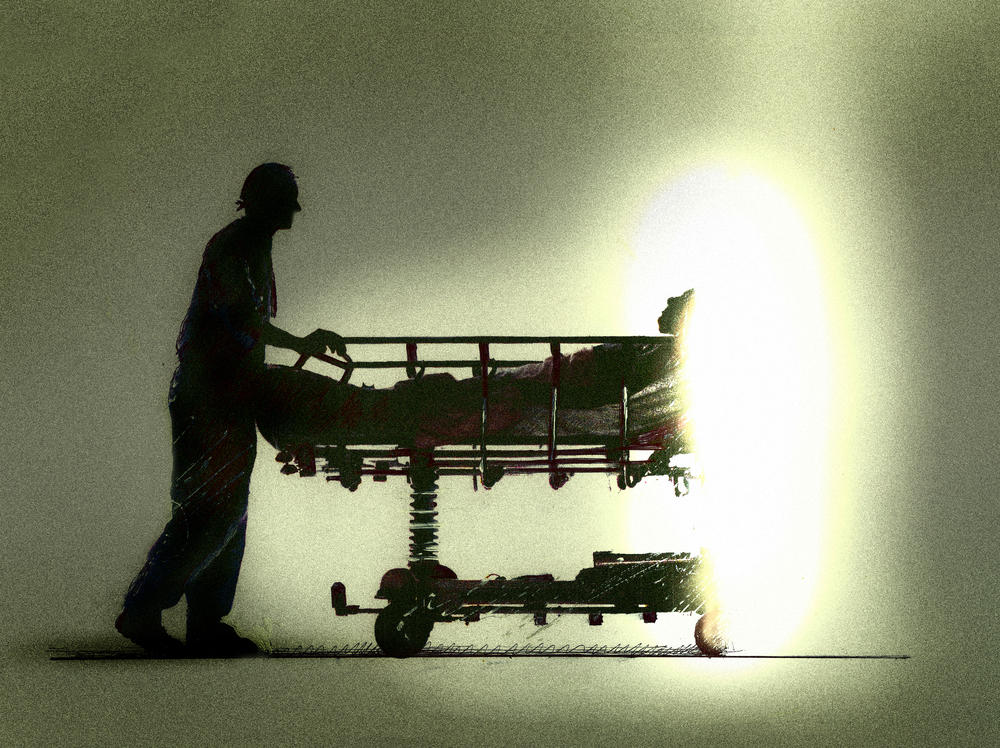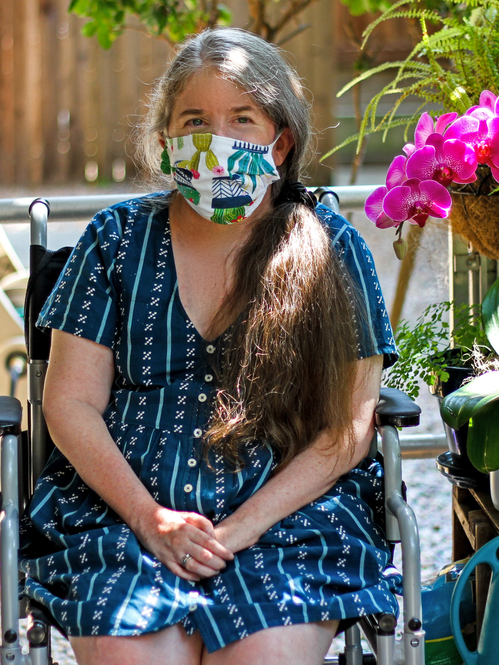Section Branding
Header Content
Disability groups claim California's assisted suicide law discriminates against them
Primary Content
A group of people with disabilities is suing to upend California's assisted suicide law, saying the bias they faced trying to get health care during the pandemic shows the system is too quick to offer death as an appropriate outcome.
The lawsuit, filed against state officials and agencies, argues that California's 7-year-old law that allows terminally ill people to choose to get lethal drugs to end their life — the End of Life Option Act — puts disabled people at greater risk of being coerced into seeking assisted suicide.
The lawsuit says people with disabilities often face a denial of the medical care they need and, as a result, may be quick to seek assisted suicide as an option.
Ingrid Tischer, who is one of the plaintiffs in the lawsuit, says she experienced that.
Tischer, who lives with a form of muscular dystrophy, has been around doctors her entire life. In 2021, in the middle of the pandemic, Tischer was hospitalized for pneumonia. When she asked for therapy to regain her strength, the doctor said she didn't qualify.
"He kind of looked at me and said, 'Well, I mean, look at you, there's nothing we can do for you. And you've known this is coming for a long time. So why are you surprised?'" Tischer says.
Tischer, who was 55 then, says she was devastated. She thought she was facing the end of her life. "For me, it was a very solid gut punch," she says.
If a doctor had told her she should apply for California's assisted suicide law, she says she might well have said yes.
No doctor ever suggested that to Tischer. The lawsuit doesn't mention any cases of that kind of coercion.
Tischer, instead, got another doctor, who gave her a different diagnosis. She left the hospital and recovered.
Tischer and the other plaintiffs raise fears of a subtle kind of discrimination — what Michael Bien, the lawyer who filed the challenge, calls "steering." Bien says people who have difficulty getting the care they need may feel compelled, instead, to see assisted suicide as their best option.
The End of Life Option Act requires people to make a clear choice to end their lives. But, Bien argues, the choice of people with disabilities gets clouded by whether they get the medical care and support that helps them live.
"Is it really a choice," Bien asks, "when society makes it very difficult to access home health care support?"
For many people in California with disabilities, there are long waits — often months long — to get a direct support professional to provide the in-home support that allows them to live independently. California is known to have a generous program. But a report by the state auditor in 2021 found that even when people get into the In-Home Supportive Services Program, some 40,000 a month don't get all the care they require. For someone with quadriplegia, getting an attendant to help them get in and out of bed may determine whether they can go to school or work, and stay out of a nursing home.
Lonnie VanHook, another individual plaintiff in the lawsuit, has quadriplegia and needs round-the-clock assistance, including people who can move him in his bed or wheelchair to prevent him from getting painful bedsores. But when he couldn't get enough hours of care, he became depressed and considered assisted suicide.
Jules Steimnitz, a rehabilitation doctor, calls this "attendant deficiency diagnosis, that you can't get attendants." Steimnitz, who first treated VanHook more than three decades ago, kept in touch and helped talk him through that desperation. "This is his main problem. This is what's causing his depression. He doesn't need suicide. He needs attendants."
"Over the years, it has been a continuous uphill battle" to get that assistance, VanHook told NPR. "It's a mental drain. It's debilitating."
The lawsuit says VanHook, as a Black man with little income, is at an increased risk because of racial disparities in health care.
The limits of health care systems became more clear early in the pandemic. When health care providers feared possible shortages of ventilators and other treatments, states issued guidelines — called "crisis standards of care" — that sometimes gave doctors and hospitals permission to put disabled and elderly people at the back of the line if care got scarce.
The U.S. Department of Health and Human Services stepped in and stopped it.
Among several states that agreed to rewrite their triage guidelines: Tennessee revised rules that let care be denied to people who already use a ventilator, those with advanced neuromuscular conditions like ALS, and some people with dementia and traumatic brain injuries. Officials in Pennsylvania changed standards that told hospitals it was OK to cut off care to some people with chronic lung disease or cancer. Alabama rewrote rules that allowed the denial of ventilators to people with "moderate to severe dementia."
People who work with California's assisted suicide law acknowledge that disabled people often struggle to get adequate medical care, but they say the state's end-of-life law is set up to avoid precisely that kind of discrimination.
"Having a disability would not qualify someone for aid-in-dying," says Nathan Fairman, a psychiatrist and palliative care doctor who oversees cases at UC Davis Health in Sacramento. "Someone who's disabled and has end-stage cancer would potentially qualify. And they would have to step through all of the safeguards that are set out in the law."
Two doctors, he notes, need to confirm that someone is terminally ill and mentally competent to choose to die. Health care systems like his, Fairman says, add psychological and other evaluations that go beyond the state law to further protect against abuse.
Oregon went first and other states followed
The lawsuit was filed by four disability rights groups — United Spinal Association, which advocates for veterans and others with spinal cord injuries; Not Dead Yet and the Institute for Patients' Rights, two groups that oppose assisted suicide laws; and CALIF, a Los Angeles nonprofit run by people with disabilities.
A spokesperson for the California Department of Public Health, the agency that keeps the statistics on who uses the assisted suicide law, said it "does not comment on litigation."
Oregon was the first state to implement a right-to-die law, in 1997. Washington state was next, in 2009. Since then, such laws have spread quickly. Now, 10 states and the District of Columbia allow assisted suicide for terminally ill people who are competent to make that choice.
In California, between 2016, when the law took effect, and the end of 2021, 3,766 people got prescriptions for the medications and 64.3% of them are known to have taken those pills, according to the most recent annual report by the California Department of Public Health.
The lawsuit, filed in the U.S. District Court for the Central District of California, argues that the state's assisted suicide law violates due process protections guaranteed by the U.S. Constitution and violates the anti-discrimination provisions of the Americans with Disabilities Act.
Some want to use the law to end their lives — but can't
But that's not the only challenge to the law under the ADA. Dr. Lonny Shavelson, a proponent of assisted suicide laws, recently sued California on behalf of disabled people who want to use the law to end their lives but can't.
The End of Life Option Act says that a person who gets lethal medications must be able to take those pills themselves. That's a common safeguard in assisted suicide laws, to prevent coercion by family members or others.
But Shavelson, a co-founder of the American Clinicians Academy on Medical Aid in Dying, says it ends up discriminating against some of the people who most clearly want to use the law — but can't take the pills themselves because of the progression of their disease, such as people with ALS and Parkinson's.
They are denied "the same access to the law that able-bodied people receive because they're unable to self-administer the medications, " he says. "We've denied them assistance to a legal medical procedure."
Shavelson's lawsuit was rejected by one U.S. District Court in California and is now on appeal.
Today, Ingrid Tischer is working again, helping nonprofits do fundraising. She looks back at the time two years ago when she was hospitalized, having difficulty breathing and ready to give up. She says she was driven then by fear — of dying or moving to a nursing home and of a "mass of misplaced guilt" that she'd become a burden to her husband. "I just wanted out," she says. "I don't think I was thinking very clearly."
But Tischer had resources that turned her around — that supportive spouse, a solid family income, a house, reliable health insurance and her long personal experience navigating the medical system.
"There are many people in this world who are a lot more vulnerable than I," she says, and — as a result — more likely, she believes, to seek assisted suicide.
This story was edited by Robert Little. It was produced by Meg Anderson.
Copyright 2023 NPR. To see more, visit https://www.npr.org.


